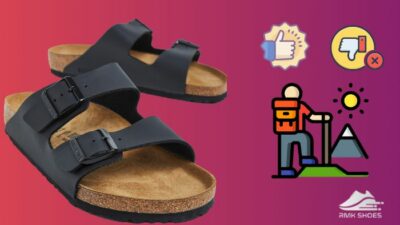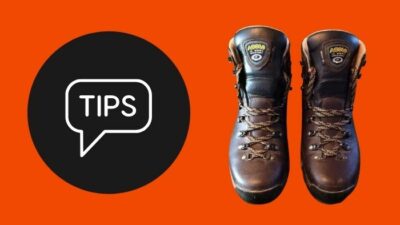Curious why special forces wear hiking boots?
Don’t worry, your curiosity ends here. As this article will tell you the exact answer to your question.
So why do special forces wear hiking boots?
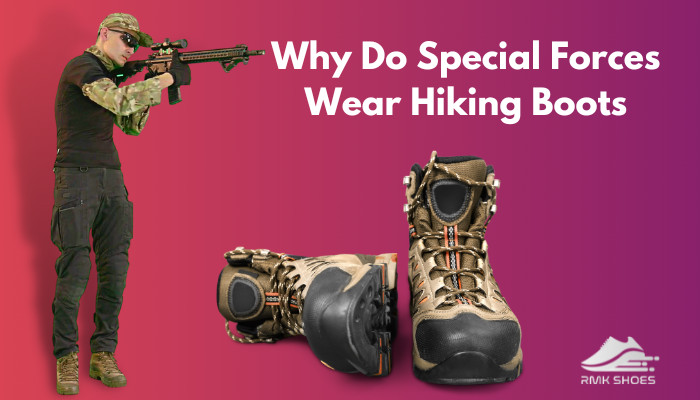 Keep on scrolling to find them out.
Keep on scrolling to find them out.
Top 12 reasons why special forces wear hiking boots
| Terrains (Uneven, rough, slippery lands) | Missions (Raid, counterterrorism, reconnaissance) | Environment (Hills, forests, riverside, mountains, deserted areas) | Seasons (Summer, winter, rainy, spring) | |
|---|---|---|---|---|
| Hiking Boots | ✔ | ✔ | ✔ | ✔ |
| Rain Boots | ✔ | ✔ | ||
| Heeled Boots | ✔ | ✔ | ||
| Work Boots | ✔ | ✔ | ✔ | |
| Knee High Boots | ✔ | ✔ | ||
| Cowboy boots | ✔ | ✔ | ||
| Snow Boots | ✔ | ✔ |
Here are the 12 reasons why special forces wear hiking boots:
1. Extreme Shock Absorbing capability
- Feature: Hiking boots have an extra thick midsole to absorb shock to protect feet from accidents.
- Special Force condition: Armies, navies, or any soldiers may get a heavy blow from rocks, bricks, or explosions during a mission.
2. Best Slip Resistant architecture
- Feature: The outsole of a hiking boot is made of tight rubber. The friction from the rubber holds tightly onto the ground and hence avoids slipping frequently on risky areas.
- Special Force condition: During training or real-life missions, the special forces may need to run on slippery surfaces caused by rain, muddy area, or rocky area.
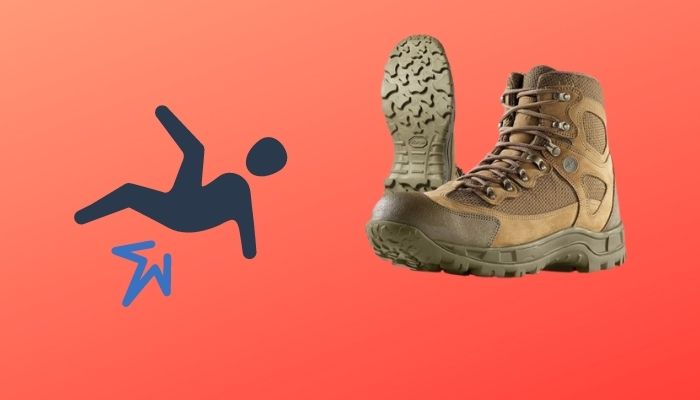
To avoid slipping in such situations, hiking boots serves the best slip-resistant service.
Some more guides on why do Logger Boots have High Heels?
3. Sweat-free Breathable texture
- Feature: The boots have internal breathable materials(nubuck, nylon, full-grain leather) to absorb the sweat to keep feet healthy from germs.
- Special Force condition: During summer, the extreme heat causes armies to sweat leading to long-term infections in their feet.
In order to stay safe from such health issues, the hiking boots absorb the sweat and keep them dry all day long.
Check out my new post on What is A Soft-Toe Work Boot.
4. Great Ventilation for airflow
- Feature: The boots have ventilating holes or eyelets to allow air to pass through. This helps to keep an optimum temperature without letting your feet heat up.
- Special Force condition: Just like the breathable material, this feature allows special forces to keep their feet cool and sweat-free during heated seasons.
5. Very Long-lasting
- Feature: The materials used are of very high quality. They are also rough, thick, and tested for their longevity.
- Special Force condition: Armies or Naval forces may have months or year-long missions.
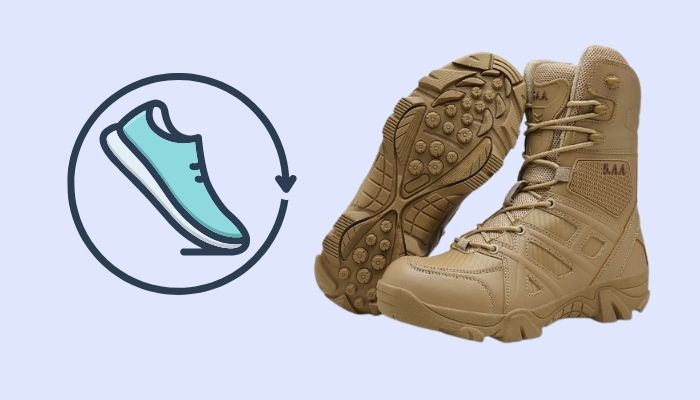
During such missions, they require durable boots that can last long. Such durability is best provided by hiking boots.
6. Comfortability
- Feature: They include cushioned insole that keeps feet comfortable even during harsh times.
- Special Force condition: Special forces sometimes need to keep their boots on for days in mountains or deserted areas.
For such a long period, they require warmth and comfort in their feet. The best type of boots that help them during such times is hiking boots.
Some more guides on Dan Post Boots Sizing With Chart.
7. Long-term Waterproofing feature
- Feature: Hiking boots have the best waterproofing membrane among all other boots. It helps them stay waterproof for a long period.
- Special Force condition: Unlike other features, the waterproofing feature is a must for special forces. It’s because their training or real-life tasks do involve rainy or muddy terrains.
In order to keep their feet dry for a long period as the tasks may last for years, hiking boots are best suited in this field.
Related content you should read about why do Soldiers Wear Combat Boots and not Sports Shoes?
8. Lightweight Design
- Feature: Hiking boots are made of lightweight materials such as synthetic denier Nylon or Cordura. This allows you to run fast with a lot of flexibility.
- Special Force condition: During missions, special forces are ought to run fast. So if the boots are too heavy, it might get difficult for them to move flexibly.
This is why hiking boots are chosen as they are known to be very lightweight among others.
9. Provides Ankle Support for safety
- Feature: The high shaft of hiking boots is specially made to be soft and flexible but hard enough to support the ankle.
- Special Force condition: Not all special forces are concerned about supporting their ankle, as there is a bigger need for flexibility around the ankles for twisting and turning.
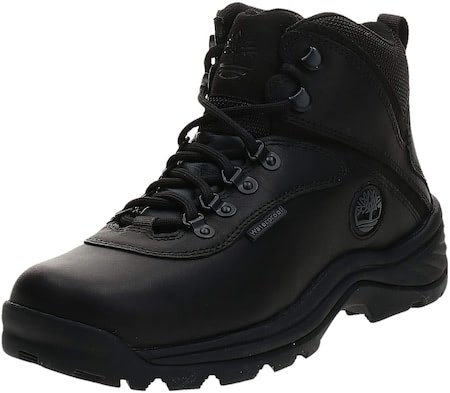
Even if they choose high shaft hiking boots, they prefer them to be less hard and more flexible to twist their ankles during missions.
10. Keeps body stable
- Feature: Hiking boots have special outsole designs to ensure stability on any type of land. That includes rough, smooth, and slippery terrains.
- Special Force condition: Whether it’s on ruins, exploded areas, mountains, or riversides, a special force is required to be extremely stable. Due to unstable boot conditions, a soldier may even die.
This is why hiking boots are chosen as they are tested to be very stable compared to other boots.
Follow our other guide to know Are Work Boots Tax-Deductible.
11. Hard Protection during risky missions
- Feature: They contain a thick and tough outer layer for hard protection against shocks or rough surfaces.
- Special Force condition: Armies or any kind of special forces may face unwanted blows at any moment.
To keep feet protected from such shocks or accidents, hiking boots provide the best protection.
12. Insulation for freezing environment
- Feature: The inner sole has 200 grams of the insulating layer to trap heat during winter.
- Special Force condition: One of the harshest seasons a soldier face is a winter. Just like thick jackets, they require boots that can trap heat for a long time.
Once again, the hiking boots win the test. They have the best insulating material that keeps their feet warm during freezing seasons.
But before that, go through our epic guide on when to replace Hiking Boots?
5 reasons why special forces do not choose other boots
You might wonder why hiking boots are preferred over other boots.
The answer is simple. There are 5 reasons that other boots failed the test but hiking boots did not.
- Lack of long-term insulating material
- Boots made of relatively heavier materials
- Do not provide hard protection and are not stable
- Do not provide the last longing features
- Lack of ventilating holes or eyelets
12 days and a wake-up
12 days and wake-up is a phrase well known among special forces. It means, you stayed for 12 days and wake up is the last day you stay in a certain place.
Since you covered 12 reasons, so I chose the number 12 and now you are at your last stoppage.
In this article, we covered 12 reasons why hiking boots are worn by special forces and 5 reasons why they do not prefer other boots.
Let us know in the comments what is your take on special forces hiking boots.


